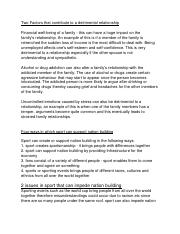
The Impact of Names on Relationships: A Comprehensive Analysis
Introduction
Names hold immense significance in shaping our identities and interpersonal connections. They can evoke positive or negative emotions, influence perceptions, and play a crucial role in the dynamics of relationships. This essay delves into the intricate relationship between names and relationships, exploring two key factors that can contribute to a detrimental impact.
Factor 1: Negative Associations
a. Historical and Cultural Context
Names can carry historical or cultural connotations that evoke negative emotions. For example, names associated with historical figures or events that evoke feelings of hatred, violence, or oppression can create a barrier in relationships.
b. Personal Experiences
Negative personal experiences associated with a particular name can also lead to detrimental effects. If an individual has had a traumatic experience with someone who shared the same name, they may subconsciously associate that name with negative feelings.
c. Stereotypes and Prejudice
Names can be subject to stereotypes and prejudices, which can influence how individuals perceive and interact with others. For instance, names associated with certain ethnic or socioeconomic groups may trigger biases that can hinder relationship formation.
Factor 2: Incompatible Meanings
a. Meaningful Names
Names that carry significant meanings can create expectations and assumptions within relationships. If the meaning of a name does not align with the individual’s personality or behavior, it can lead to disappointment and conflict.
b. Disparities in Name Preferences
When individuals have different preferences for names, it can create tension and resentment. For example, if one partner strongly dislikes the other partner’s name, it can undermine the emotional connection between them.
c. Changing Names
Changing one’s name can be a significant event that can impact relationships. If a name change is not discussed or agreed upon with the partner, it can create feelings of betrayal or alienation.
Consequences of Detrimental Relationships
Relationships affected by negative associations or incompatible meanings can experience a range of detrimental consequences, including:
- Communication Barriers: Negative emotions or misunderstandings associated with names can hinder effective communication.
- Emotional Distress: Names can trigger feelings of anger, sadness, or anxiety, which can strain relationships.
- Power Imbalances: Names can create power imbalances if one partner’s name is perceived as more desirable or prestigious than the other’s.
- Relationship Dissolution: In severe cases, detrimental relationships can lead to separation or divorce.
Strategies for Mitigating Detrimental Effects
To mitigate the detrimental effects of names on relationships, several strategies can be employed:
- Open Communication: Discuss any negative associations or name preferences openly and honestly with the partner.
- Empathy and Understanding: Try to understand the other person’s perspective and the reasons behind their name-related feelings.
- Compromise and Flexibility: Be willing to compromise or consider alternative names if necessary.
- Focus on the Individual: Emphasize the person’s character and qualities rather than their name.
- Professional Help: If name-related issues are causing significant distress, consider seeking professional help from a therapist or counselor.
Conclusion
Names are powerful symbols that can shape the dynamics of relationships. While names can be a source of pride and connection, they can also contribute to detrimental effects if associated with negative experiences or incompatible meanings. By understanding the factors that can lead to a detrimental relationship, individuals can take proactive steps to mitigate these effects and foster healthy, fulfilling connections. Open communication, empathy, and a willingness to compromise are essential for navigating the complexities of name-related issues in relationships.